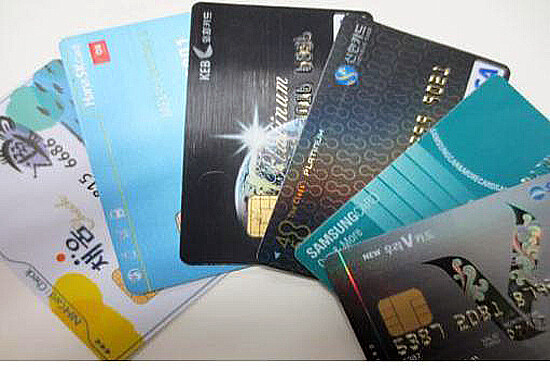
Seoul, South Korea – The burgeoning appetite for international travel among Koreans is igniting a fierce battle for market share within the nation's credit card industry. As outbound tourism rebounds robustly, card companies are aggressively vying to capture the spending of these globetrotters. In the realm of credit cards, Hyundai Card currently holds the top spot, but rivals Shinhan Card and Samsung Card are mounting a strong challenge. Meanwhile, Hana Card has established a commanding lead in the debit card segment, capitalizing on its popular travel-centric offerings.
Data released by the Credit Finance Association reveals the substantial growth in overseas card usage. During the first quarter of this year, the top eight specialized Korean card companies processed a total of KRW 6.4068 trillion (approximately USD 4.7 billion) in overseas credit and debit card transactions, marking a significant 12% increase compared to the same period in the previous year. Notably, the debit card sector is experiencing particularly rapid expansion, with overseas debit card spending surging by an impressive 45% year-on-year to KRW 1.7218 trillion (approximately USD 1.26 billion) in Q1 2025.
Hana Card has emerged as the undisputed leader in the overseas debit card market. In the first quarter of this year, Hana Card users spent KRW 757 billion (approximately USD 554 million) abroad using their debit cards, securing a dominant 44% market share. This success builds upon Hana Card's strong performance in the previous year, where it recorded an annual overseas debit card usage of KRW 2.6606 trillion (approximately USD 1.95 billion), also claiming the top position. The stellar performance of Hana Card's 'Travlog' card, a product specifically tailored for overseas travel with benefits like multi-currency wallets and favorable exchange rates, is widely credited for this remarkable success. Trailing behind Hana Card in the debit card race are Shinhan Card with KRW 541.6 billion (approximately USD 397 million), KB Kookmin Card with KRW 227.5 billion (approximately USD 166 million), and Woori Card with KRW 188.9 billion (approximately USD 138 million).
The competition within the credit card sector presents a more tightly contested landscape. While Hyundai Card currently holds the leading position in overseas credit card payments, the gap with its closest competitors is relatively narrow. In the first quarter of 2025, Hyundai Card reported KRW 1.0238 trillion (approximately USD 750 million) in overseas credit card spending, capturing approximately 22% of the market. Shinhan Card is hot on its heels, ranking second with KRW 836.6 billion (approximately USD 613 million). An analysis of individual lump-sum payments reveals an even closer race, with Samsung Card registering KRW 596 billion (approximately USD 436 million), surpassing Shinhan Card's KRW 545 billion (approximately USD 399 million) in this specific metric and positioning itself as a strong contender chasing Hyundai Card's KRW 880.8 billion (approximately USD 645 million).
The intensifying competition in the overseas payment market reflects the broader strategic imperatives of Korean card companies. With the domestic market facing saturation and limited growth potential, the burgeoning overseas travel sector presents a significant opportunity for expansion and revenue generation. The increasing demand for travel-specific card features, such as favorable foreign exchange rates, waived international transaction fees, and travel insurance benefits, is further fueling this competitive drive.
Industry analysts anticipate that this battle for overseas spending will only escalate in the coming years. The pent-up demand for international travel following the pandemic is being unleashed, and card companies are keen to position themselves as the preferred financial partners for these outbound tourists. This involves not only offering attractive card products but also forging strategic partnerships with airlines, hotels, and other travel-related businesses to enhance the value proposition for their cardholders.
Furthermore, the rise of fintech companies and digital payment platforms in the cross-border payments space is adding another layer of complexity and competition to the market. Traditional card companies are increasingly recognizing the need to innovate and adapt to these evolving trends to maintain their relevance and market share. This includes investing in digital infrastructure, enhancing mobile payment capabilities for international transactions, and exploring partnerships with fintech firms to offer more seamless and cost-effective overseas payment solutions.
An industry insider aptly summarized the situation, stating, "There are limitations to growth in the domestic market alone. As the number of overseas users continues to rise, competition among card companies to expand their market share in the overseas payment market will become fierce." This underscores the strategic importance of the overseas market for the future growth and profitability of Korean card companies. The winners in this competitive landscape will likely be those who can best understand and cater to the evolving needs and preferences of international travelers, offering innovative and compelling financial products and services that enhance their overseas experiences. The current jostling for position among Hyundai, Shinhan, Samsung, and the dominant performance of Hana Card in the debit segment signal a dynamic and evolving battleground in the lucrative overseas payment market.
[Copyright (c) Global Economic Times. All Rights Reserved.]



























